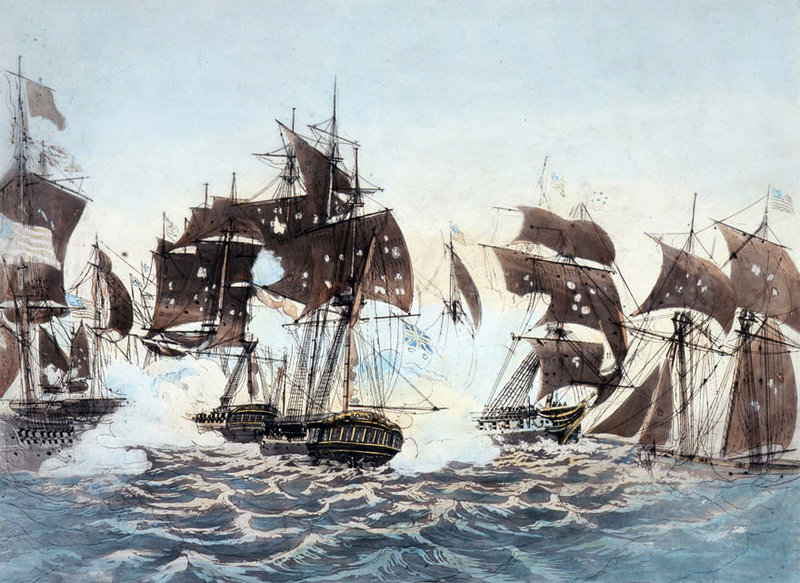WASHINGTON — Faced with little public understanding of its modern mission, the U.S. Navy is reaching back 200 years to the War of 1812 in the hopes of bolstering its standing with the American people.
This week it launches an ambitious, three-year commemoration to mark the bicentennial of the often overlooked war. Beginning today in New Orleans, and continuing through the summer in New York, Norfolk, Baltimore and Boston, tall ships and warships from around the world will parade through American ports.
But unlike previous commemorations, the Navy wants to reap lasting benefits from the War of 1812 and plans to immerse the public in a flood of information and events, including educational outreach, Web sites, social media, online games, books and museum displays.
Polling for the Navy by Gallup has shown that less than 9 percent of Americans understand its mission. Equally worrisome, the public ranks the Navy ahead of only the Coast Guard in its importance to national defense, and well behind the Army, Marines and Air Force.
The results have raised alarms within the Navy at a time when the military services face daunting budget cuts.
Although it may seem odd to turn to the Age of Sail to prove the Navy’s modern relevance, senior Navy officials argue that a war fought with a few wooden frigates under the flag of “Free Trade and Sailors Rights” directly relates to the mission of the Navy today, including keeping choke points such as the Strait of Hormuz open against threats from Iran and battling piracy off Somalia’s coast.
“We’re doing about the exact same things today that we were doing 200 years ago — protecting freedom of the seas,” Navy Secretary Ray Mabus said after a recent bicentennial reception in Washington.
The Navy has long claimed the War of 1812 as its coming of age and one of its most glorious episodes, from the USS Constitution’s smashing single-ship victories to Commodore Oliver Hazard Perry’s defeat of a British fleet on Lake Erie.
By war’s end, the fledgling Navy was left with a host of heroes and some of its most enduring slogans, among them “Don’t give up the ship.” Most importantly, perhaps, a grateful Congress authorized a steady stream of funding to build a permanent and powerful fleet.
This is a lesson the Navy would like to see emulated.
The Navy is battling what Mabus called the “misperception” that it has not been deeply involved in the wars in Iraq and Afghanistan, where the Army and the Marine Corps have borne the brunt of the fighting.
Only 11 percent of respondents in 2011 named the Navy as the military service most important for national defense, compared with 25 percent for the Army, 24 percent for the Marines and 17 percent for the Air Force. In 2002, before the start of the Iraq war, the Navy stood at 17 percent, roughly equal to the Army and Marines.
The Marine Corps, though a component of the Navy, is a separate branch of the military. Although the Navy basked in the glory of the SEAL raid that killed Osama bin Laden last year, the role of its ships and sailors in the region is often overlooked, Mabus said.
“The poll data showed the American people don’t understand why we need a navy,” said Michael J. Crawford, senior historian for the Naval History and Heritage Command. “The leadership of the Navy has decided this is an opportunity not to be missed to explain to American people what the Navy is.”
But a recent report from the naval inspector general questioned the strategy, noting that the Navy’s history command is hampered by limited resources, and that many of its historic paintings, documents and artifacts are “in jeopardy” because storage facilities lack adequate temperature and humidity controls.
“Although the War of 1812 Commemoration is advertised to be the … ‘moon shot’ that propels the image of the Navy and public perception out of its historic low . . . many staff historians feel senior [history command] leadership is focused on comemorations to the exclusion of other critical mission areas,” the report said.
Gallup will survey six cities for the Navy before and after bicentennial events are held this year, measuring whether the effort improves public understanding of the service. That, the Navy hopes, will translate into public and congressional support for its budget.
Send questions/comments to the editors.



Success. Please wait for the page to reload. If the page does not reload within 5 seconds, please refresh the page.
Enter your email and password to access comments.
Hi, to comment on stories you must . This profile is in addition to your subscription and website login.
Already have a commenting profile? .
Invalid username/password.
Please check your email to confirm and complete your registration.
Only subscribers are eligible to post comments. Please subscribe or login first for digital access. Here’s why.
Use the form below to reset your password. When you've submitted your account email, we will send an email with a reset code.